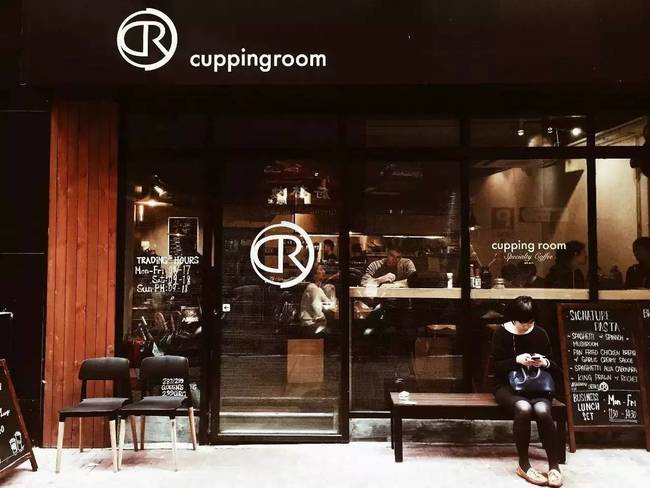The struggle among the three factions of Chinese cafes in the Internet era
Quickly expand the cafe, carving time into the Internet, Starbucks to do direct camp, coffee with you, diffuse coffee and other Korean coffee is still busy to join, behind the mellow coffee shop, the market competition has entered a white-hot stage.

Titanium media note: China's current per capita annual coffee consumption is 5 cups, which is far lower than the annual per capita level of about 300 cups in Japan and South Korea, and the world average is about 240 cups. However, China's coffee consumption continues to grow at an annual rate of 15% to 20%, and is becoming the most potential coffee consumer in the world. At present, there are three active forces in the Chinese market: local, European, American and Korean. In different ways, what preparations have they made for the coming market war re-opened by the Internet?
China's coffee market is entering a white-hot stage.
Usually, the period of economic slowdown after a period of rapid economic growth is a period of explosion in restaurants, cinemas and cafes. Economic development will lead to the improvement of general living standards, while the slowdown in the speed of development will give people more time and impulse to think and enjoy life. And China is entering this stage.
In 2012, coffee consumption in the Chinese market was about 130000 tons, and China's coffee consumption continued to grow at an annual rate of 15% to 20%, making it the most potential coffee consumer in the world. At present, China's per capita annual coffee consumption is 5 cups, which is far lower than the annual per capita level of about 300 cups in Japan and South Korea, and the world average is about 240 cups.
Starbucks praised the Chinese market as the "second home market", which shows the great potential of the Chinese market. In 2104, China's coffee consumption reached more than 500000 tons, and the market retail sales were close to 60 billion yuan. The growth rate of the Beijing market alone has reached 18%. There are 13600 cafes and 2200 coffee-related enterprises across the country, employing 500000 people.
At present, there are three active forces in the Chinese market: local, European, American and Korean. They are preparing for the coming market war in different ways.
Sculpture time: the Internet changes competitive Strategy
Starbucks, which claimed to be a coffee e-commerce platform several years ago, repeatedly delayed its launch plan and finally decided to focus its online business on "membership services". On December 15, 2014, to the surprise of the coffee chain, carving time (hereinafter referred to as "Diaoguang"), a 17-year-old local coffee chain, built a professional coffee website in just six months.
On the day Hello coffee was officially launched, we saw almost all the world's top coffee brands, raw material suppliers, coffee-making utensils, coffee peripheral products, and even competitors' Banner on the literary and artistic page. It can be seen on this site that carving time is trying to break the shackles of competition and work with coffee brands to create a focused and perfect supply chain of coffee and its surrounding formats.
Zhao Kedong, CEO of Diaoguang, told Commercial value:
"in the 17 years of operation, we have gradually found that there is no real professional and perfect platform in China to guide how to choose our own coffee taste from thousands of coffee categories. We firmly believe that those who know how to appreciate coffee will know how to taste coffee and become Bole who appreciates coffee. Our original intention is very simple: we want friends who are full of love for coffee to stop worrying about the source and safety, to select more professionally, to find a platform full of coffee feelings, to taste coffee together, and to evolve into a Bole who understands life and coffee. "
In 1997, when Chuang Tsai, a Taiwanese boy, opened the first sculpture time cafe outside Peking University, this small shop with JAZZ or Bossa Nova music became a gathering place for Chinese intellectuals and literary youth. In 17 years, carving time has opened more than 40 branches in 20 cities across the country, and completed two rounds of financing.
Under the big brand of carving time, it has formed collectivized enterprises with sub-brands such as "Shangda Public Relations Company", "Border Design Company", "Qige clothing", "Life Market", "Coffee College", "Hello coffee" and so on. Founder Zhuang Yueli does not deny that they are making adequate preparations for the "listing". Zhao Kedong added:
"if it were Taiwan or the new third board, we would have been on it years ago, but we don't want to go public for the sake of listing."
The goal of Zhao Kedong and Zhuang Yuli is to turn the carving time into a "century-old shop", but under the main theme of "slow style", Internet practice is achieving their "fast pace" in business. The idea of "building a website" came into being in June 2014.
"many of my friends are in the Internet circle, and communicating with them makes me feel that 'change' in traditional industries is imperative. Many of our colleagues think that having a shop in 'Tmall' and 'JD.com' is the Internet. I think if we want to do it, we should do it in place. "
Hello coffee's team was only built in July and was officially launched on December 15th. Zhao Xin, head of the Hello coffee team, stressed that this is China's first coffee B2C website, and there will be no competitors for content in the coming year.
"the coffee industry is not mainstream enough in China. There will be no more than 100 good coffee merchants in Beijing. Now 60 have signed up to Hello coffee. We want to be a professional coffee vertical e-commerce. Except for large-scale chain stores like Starbucks, those coffee shops with characteristics will become our merchants."
At present, Hello coffee has a three-dimensional warehouse of 1000 square meters and has signed contracts with four logistics companies. In the coming month, APP clients will also be launched. Zhao Kedong said that when Dioguang opened its first coffee shop, Starbucks had not yet entered China. Today, Dioguang's competitors throughout the country, the increasingly mature coffee consumer market, attracting different styles of coffee brands to join this enclosure war. Local cafes should not only play a good cultural card, but also continue to cultivate the market.
Fortunately, they have learned to use the power of capital and the advantages of the Internet to provide a greater stage and influence for brands. Competition cannot be confined to one dimension.
Starbucks: marketing Strategy under Fast consumption
The American coffee chain led by Starbucks has sprung up everywhere in China's major shopping malls and office buildings. it is undeniable that no one is second to none in the chain coffee brand. Although COSTA tries its best to imitate and follow, it is also eating away at Starbucks' market, but it has never been able to form a competitive force against it.
Born in 1971 at Starbucks Cafe in Seattle, USA, it was formerly a coffee bean supplier. After running a small green cafe, founder Schultz unexpectedly achieved commercial success and dominated the coffee chain market 20 years later, becoming a global enterprise.
Like all American fast food restaurants, Starbucks has found in market practice that Americans are not willing to spend a long time in a cafe with a cup of coffee like the French and Italians. Thinkers and writers such as Hemingway, Balzac and Freud prefer to spend their time in the "God of Flowers" cafe on the left bank. Americans in the 1970s are in a period of struggle, their pace of life is very fast, believing in the value of "time is money".
For operators, the long stay of customers means that sales slow down, and sales can continue to increase only when customers are mobile. The process of making coffee has also been greatly simplified. Starbucks uses a fully automatic coffee machine that takes only two minutes to make a cup of coffee. The new products of each season are blended through "fruit paste". From receiving a guest to producing a cup of coffee and handing it over to the guest, the time is precisely controlled.
Important Notice :
前街咖啡 FrontStreet Coffee has moved to new addredd:
FrontStreet Coffee Address: 315,Donghua East Road,GuangZhou
Tel:020 38364473
- Prev

Live slowly as a literary youth in Hong Kong, experience the human feelings in Sheung Wan Lane.
The impression of Hong Kong is always crowded with people and filled with a fast-paced sense of urbanization. If you are tired of the scenic spots after visiting the mall and want to find a quiet corner to rest, you might as well go into the alley, feel the humanity and comfort on the ground, and sit leisurely in the cafe for a warm afternoon. (photo: instagram@mrgumbatron) and Sheung Wan itself is a special feature.
- Next

Melbourne without coffee is not a good cultural village. Take stock of ten "alley coffee".
It has rained one after another in recent days, and the temperature has dropped sharply. I wonder if the babies of cat Ben have paid attention to keeping warm. Anyway, the editor is so frozen that his IQ has gone offline. In such a cold weather, what can you take to warm yourself to the bone marrow? Except for the male / female friends, it is probably the cup of warm hot coffee ~ director Orson. Wells (O
Related
- What documents do you need to go through to open a coffee shop? coffee shop coffee shop certificate processing process
- How to purchase Coffee beans in small Cafe how to choose a suitable supplier for domestic Coffee supply Company
- How to drink Starbucks Fragrance White Coffee? how to make Australian White Coffee? what Italian coffee beans are recommended?
- The Story of Flora Coffee: the name of Flora Coffee Bean and the implication of the Flowers on Florna Coffee
- How much does a cup of coffee cost? How much is the profit of a cup of coffee? What is the profit of the coffee shop in a year?
- Yunnan small Coffee, known as "fragrant Coffee", introduces the characteristics of Alpine Arabica Coffee producing areas in Yunnan, China
- 2023 latest Starbucks full menu price list how much is a cup of Starbucks coffee what is better to drink the most popular hot and cold drinks recommended
- Starbucks different kinds of Coffee Price list Starbucks menu 2023 Top Ten Best drinks in Starbucks
- Starbucks Spring praise Comprehensive matching Coffee Bean theme Story Packaging implication and taste description
- The cost of a cup of coffee latte American coffee cost price and selling price

